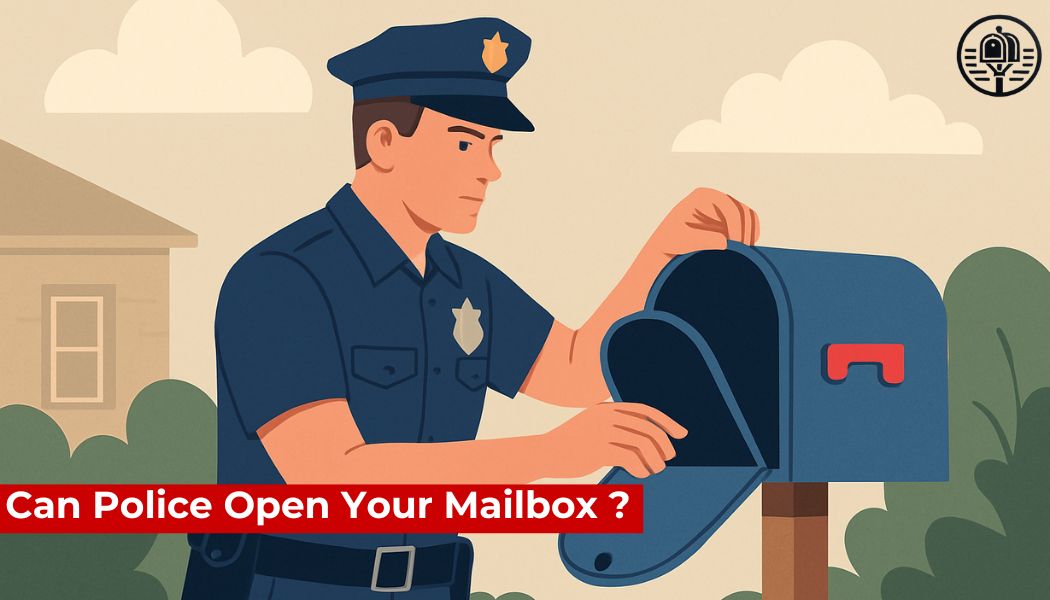Your mailbox is a central part of your home — a place where private communications and sensitive documents are delivered daily. But what happens when law enforcement gets involved? Can police open your mailbox without permission, or is that a violation of your rights? This question, while simple, is deeply rooted in federal law, Fourth Amendment protections, and practical law enforcement procedures.
In this article, we’ll explore the legality of police accessing your mailbox, under what circumstances they may do so, and how your rights are protected.
Federal Laws Protecting Your Mailbox
In the United States, your mailbox is not just a private receptacle — it's federal property once it's installed and used for mail delivery. The U.S. Postal Service (USPS) governs mailbox use under Title 18 of the U.S. Code, particularly Section 1705, which makes it a federal offense to tamper with someone else’s mailbox or mail.
This law doesn’t just apply to thieves or nosy neighbors — it applies to everyone, including law enforcement officers. That means police cannot legally open your mailbox without proper authority, such as a search warrant.
The Role of the Fourth Amendment
The Fourth Amendment of the U.S. Constitution protects citizens from "unreasonable searches and seizures" by the government. This protection extends to mailboxes, just like it does to your home, vehicle, or electronic communications.
As a general rule, police must obtain a warrant to open and inspect the contents of your mailbox. The warrant must be signed by a judge and supported by probable cause — that is, reasonable evidence that a crime is being committed and that relevant materials may be found in your mailbox.
When Can Police Open Your Mailbox Without a Warrant?
While the law typically requires a warrant, there are exceptions where law enforcement may be able to access your mailbox legally:
1. Consent
If you give the police explicit permission to search your mailbox, they may legally do so. Consent must be voluntary and not coerced.
2. Exigent Circumstances
In urgent situations — for example, if there’s an immediate threat to life or public safety — the police might be allowed to act without a warrant. However, these situations are rare and closely scrutinized in court.
3. Mail in Transit
Police cannot open mail that is in transit through the postal system. This includes letters or packages that are currently in your mailbox and haven't been retrieved yet. Opening mail without authorization is a federal crime, even for law enforcement.
4. Search Incident to Arrest
If someone is arrested near or at the mailbox, and the mailbox is considered to be within their immediate control, police might conduct a limited search — but this rarely includes mailbox access without a warrant.
USPS and Postal Inspectors vs. Local Police
It's important to distinguish between postal inspectors and local law enforcement. Postal inspectors are federal agents who work for the U.S. Postal Inspection Service — the law enforcement arm of USPS. They are specifically tasked with investigating mail-related crimes, including mail fraud, theft, and vandalism.
Postal inspectors can open and inspect mail under certain legal conditions, especially if they suspect criminal activity. However, they too must adhere to constitutional protections, including obtaining a warrant when required.
Local police officers do not have automatic authority to search your mailbox unless they're working in collaboration with federal authorities and follow the appropriate legal procedures.
Surveillance and Mail Monitoring
While the police may not be able to open your mailbox, they can monitor mail patterns — such as where letters are coming from or going to — through programs like mail covers, which have been used by federal authorities for decades.
A mail cover involves recording the information on the outside of the envelope (sender and recipient addresses) without opening it. This practice doesn't require a warrant, but it does require approval from USPS and must be part of an authorized law enforcement investigation.
Consequences of Unlawful Mailbox Access
If law enforcement accesses your mailbox without proper legal authority, any evidence they obtain may be deemed inadmissible in court under the exclusionary rule. This rule prevents evidence collected through unconstitutional means from being used against you.
Additionally, if an officer knowingly violates federal mail laws, they could potentially face disciplinary actions, lawsuits, or federal charges — though this is rare and would depend on the specific circumstances.
What to Do If You Suspect Mailbox Tampering
If you believe your mailbox has been opened without authorization, whether by law enforcement or someone else, you should:
-
Document the incident (photos, dates, and times)
-
Report it to your local post office and file a complaint with the U.S. Postal Inspection Service
-
Consider consulting a civil rights attorney to explore legal options
Protecting your mailbox privacy is a key part of safeguarding your personal information and your constitutional rights.
FAQ: Can Police Open Your Mailbox?
Q: Can police open my mailbox if it’s unlocked?
A: No. Whether your mailbox is locked or unlocked, it is still protected under federal law. Police need a warrant or your consent to access it legally.
Q: Is it illegal for police to touch or open mail in my mailbox?
A: Yes, unless they have a warrant, your consent, or meet a specific legal exception. Unauthorized access is a federal crime under Title 18 U.S. Code § 1705.
Q: Can police search outgoing mail in my mailbox?
A: Not without a warrant. Outgoing mail is still considered part of the U.S. postal system and is federally protected.
Q: Can postal workers let police open my mailbox?
A: No. Postal workers are not authorized to grant access to your mailbox unless law enforcement presents a valid warrant or court order.
Q: What should I do if I think the police searched my mailbox unlawfully?
A: Report the incident to the U.S. Postal Inspection Service and consider seeking legal advice from an attorney specializing in civil rights or constitutional law.

